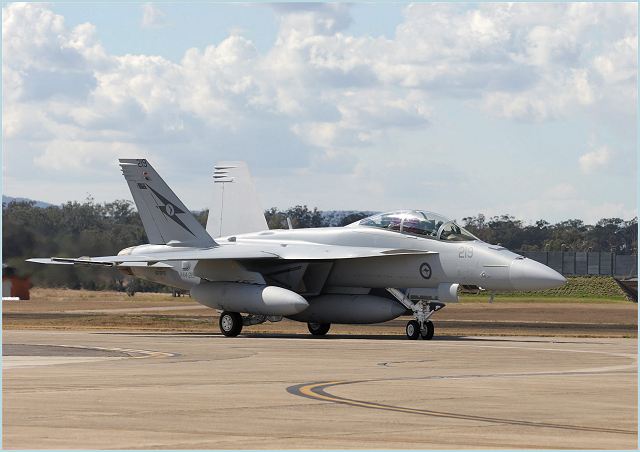The arrival at the base was marked by the four new Super
Hornets joining 16 other RAAF
F/A-18Fs
for a dramatic 20-aircraft flyover.
"The Super
Hornet provides a major advancement in capability for
the RAAF
and the entire Australian Defence Force," said RAAF Group Capt.
Steve Roberton, Officer Commanding 82 Wing. "The F/A-18F
employs the world’s most advanced combat radar, ensuring our forces
have a clear advantage in both technology and capability, whether conducting
air, ground or maritime operations.
"The Super
Hornet's ability to collect and seamlessly distribute
information to our other platforms is proving to be invaluable as a
true force multiplier," Roberton added.
"Boeing made a commitment to the Royal
Australian Air Force, and to the citizens and government
of Australia, promising that these advanced Super
Hornets would be ready to join the RAAF fleet on time
and on budget," said Dennis Muilenburg, president and CEO of Boeing
Defense, Space & Security. "The men and women of Boeing are
incredibly proud to have delivered on that promise."
"The joint efforts between Australia's Defence Materiel Organisation,
the Royal
Australian Air Force, the U.S. Navy and the Hornet
Industry Team have been absolutely paramount in the success of this
program," said Carolyn Nichols, Australian Super
Hornet program manager for Boeing. "With that
success, these Super Hornets, and the advanced capabilities they deliver,
are now ready to meet Australia's defense requirements today and into
the future."
The Australian government announced plans in March 2007 to acquire 24
advanced Block II versions of the F model Super
Hornet, which features a two-person cockpit. The first
five RAAF
Super Hornets arrived at Amberley on March 26, 2010. Today's ceremony
marks the fifth and final contracted RAAF
Super
Hornet delivery.
|



























